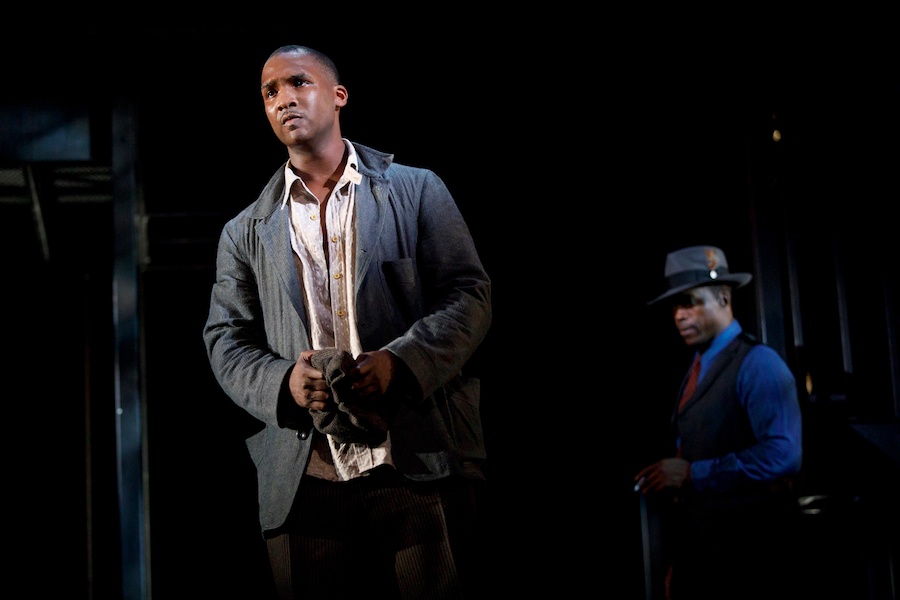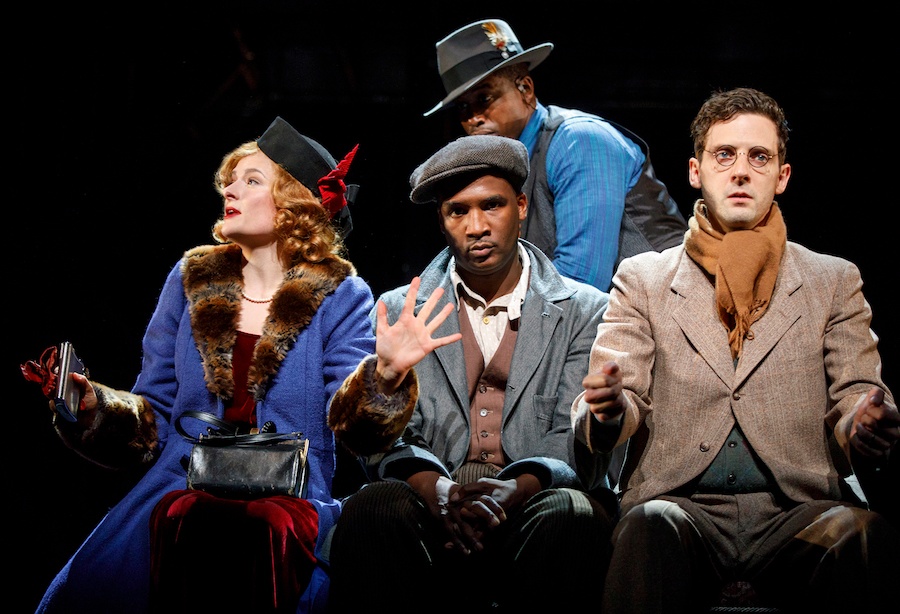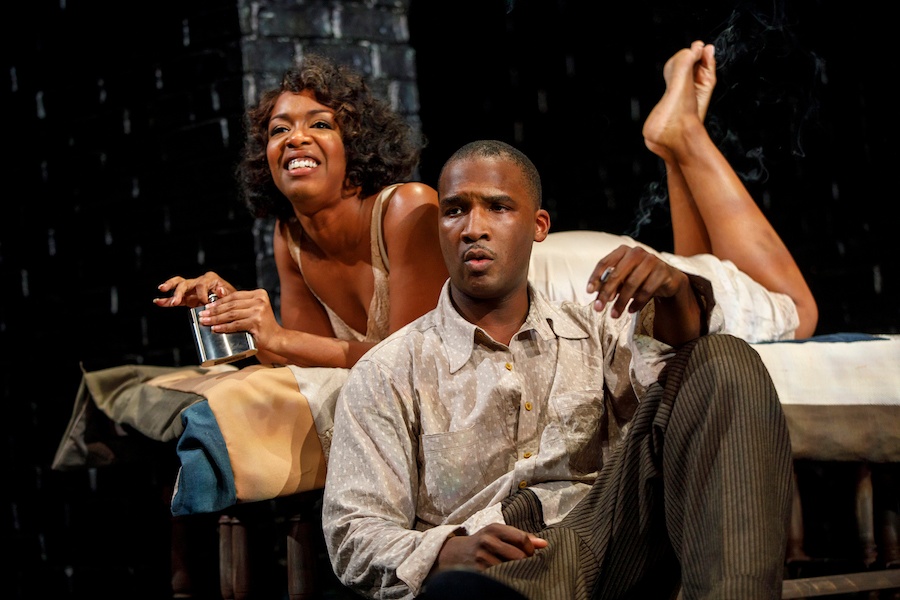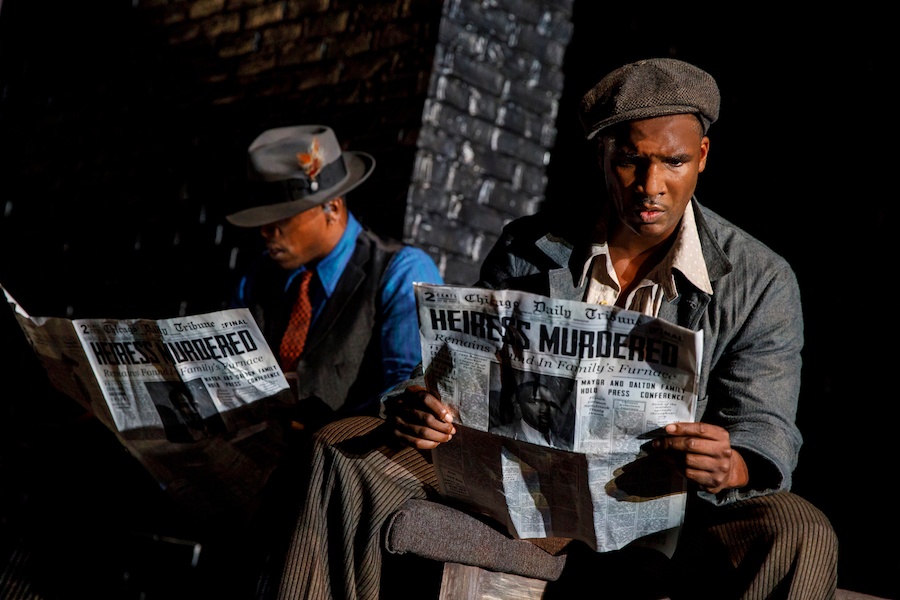
Jerod Haynes and Jason Bowen in Native Son by Nambi E. Kelley, adapted from the novel by Richard Wright, directed by Seret Scott. Photo by Joan Marcus, 2017.
The stage is set. The theater goes dark. And then, almost immediately, you realize it’s Native Son as you’ve probably never seen it before.
Nambi E. Kelley’s play Native Son is a recent adaptation of Richard Wright’s 1940s novel of the same title. Native Son tells the story of Bigger Thomas, a 20 year old Black man who sets off a series of violent events shortly after being employed by a wealthy white man and his family.
It's been more than seven decades since Wright penned the novel, bringing with it a style that was provocative, participatory and immediately controversial. With this adaptation, Kelley invites us to take a moment to breathe and watch Bigger’s life as it flashes before his eyes. The play runs at the Yale Repertory Theatre through Dec. 16.
This play follows Bigger in his race for freedom and his reflection of the moments that led to his murderous actions. Kelley captures the cruel circumstances that condemned Bigger to his fate. Chicago’s snow covered streets set the scene for the poverty and isolation that led Bigger’s name to leave 1930s Chicago streets in division and fear.
One thing is clear from the outset: this is a show that demands to be felt. The first moments rob you of any apathy. Playing Bigger Thomas, Jerod Haynes assumes Bigger’s discomfort of his Blackness under the white gaze, depicting the hopelessness of a Black boy who has the audacity to dream in a world that thinks he’s too dumb to.
“Man, I could fly, but white folks don’t let us do nothing!” Bigger exclaims in the early moments of the play. What happens to a Black boy that is robbed of opportunity before he can seize it, and what happens when that is the norm?

Louisa Jacobson, Jerod Haynes, Jason Bowen (back), and Joby Earle in Native Son by Nambi E. Kelley, adapted from the novel by Richard Wright, directed by Seret Scott. Photo by Joan Marcus, 2017.
It’s Haynes third time depicting Bigger, having previously performed the role in Chicago’s Court Theatre and at Los Angeles’ Marin Theatre Company. But on the Rep’s stage, his performance is fresh and new, as if it is a premiere. Kelley has created a new character, The Black Rat, to represent his double consciousness. This new-old representation (Jason Bowen) brings a mysterious swagger to the stage in his depiction of how Bigger wants to be seen by the world. He refuses to allow Bigger to become a victim to circumstance—or, at least, that’s his intention—but it’s not up to him.
Together, Bowen and Haynes share a chemistry that’s more like choreography, dancing us deeper into the idea that Bigger’s life is not taking a dark turn, it is one. Kelley begins the play with the moment Bigger becomes all the world thinks he is: A cold-blooded killer of Mary Dalton, high on the aristocratic white totem pole.
“You only see what they tell you you is – a black rat sonofabitch,” the Black Rat croons from his perch in the corner.
Kelley’s writing continues Wright’s legacy of provocative literature. Her words have rhythm and these actors know just how to find it. Jasai Chase-Owens, a recent graduate from The Conservatory of Theatre Arts at SUNY Purchase, brings a unique joy to the stage depicting Bigger’s friend and partner in crime, Buddy.

Jessica Frances Dukes and Jerod Haynes in Native Son by Nambi E. Kelley, adapted from the novel by Richard Wright, directed by Seret Scott. Photo by Joan Marcus, 2017.
When Buddy and Bigger are together, we can almost forget the sins of Bigger, if just for a moment. We are able to see Bigger dream, jest, and speak his truth. “Let’s play white!” Bigger exclaims to a reluctant Buddy. As Bigger assumes the whiteness of James P. Morgan, the audience is alerted to Bigger’s awareness of his circumstance. Buddy and Bigger know they’re beaten before the game even starts, but they still try to cheat it. Just as Buddy brings beauty to Bigger, he ignites fear and wrath in him as well.
Just as interesting is what’s happening behind the scenes. Director Seret Scott knows how to keep your eyes on a stage. In her third direction of the play, Scott uses every tool possible to draw audiences into Bigger’s story. As Bigger breaks and burns Mary’s body, the work of sound designer Frederick Kennedy immerses the audience in the fright of that moment. Lighting designer Stephen Strawbridge brings a necessary darkness to Bigger’s boldest moments. Through his design, we are shown that blinding rage is not always bright. Katie Touart’s costume design invites us to become lost in 1930s Chicago, in all its brute and bloodiness. The creative team created a space in which we can not just see Bigger, but feel him, mourn for him and for the state that got him there.
In this play, three women fall victim to Bigger’s spell. There is Bessie (Jessica Frances Dukes); Bigger’s mother Hannah (Yale School of Drama graduate Rosalyn Coleman); and Mary Dalton, (Yale MFA candidate Louisa Jacobson). In words, movement, and action, Coleman embodies a mother’s love and desperation. Before the stage lights are hot, Bigger names himself a murderer, and when the world finds out there are two women who stand by him, his mother and lover.
With Bigger’s fate hanging in the balance, his mother grasps for mercy. But there is none for her killer son, even if the world is just as guilty as he was. We watch Coleman plea on more occasions than one: She cries for mercy when her and her three children are being evicted, when she asks Bigger to do anything, and when she finds her son on the other side of consequence. With each plea, Coleman forces the audience to feel Hannah’s desperation, and oddly enough, hope. Hannah never gives up on Bigger,. Or, maybe it’s that she never gave in to him in the first place.
Jessica Frances Dukes’ depiction of Bessie not only makes the audience empathize with her, but humanize Bigger. In the moments where the audience is calculating just how damned Bigger is, Bessie is there to echo the obvious.

Jason Bowen and Jerod Haynes in Native Son by Nambi E. Kelley, adapted from the novel by Richard Wright, directed by Seret Scott. Photo by Joan Marcus, 2017.
“They’ll…They’ll say you raped her…,” Bessie mourns, and just like that we are sucked into the world of justice, or lack thereof. Dukes is transcendent in her ability to be both the voice of reason and the echo of consequence, and unfortunately it leads to her death. It is inevitable from the start. She is a smart Black girl in a world that asks her to be seen and not heard. What else could her fate be?
Mary Dalton, meanwhile, stands in opposition to everything that is Black. Jacobson shows us a woman that is drowned in privilege and cursed with a hero’s complex. Her blind fascination with Blackness only reminds Bigger of his place in the world. Mary is void of empathy, a pattern that seems to repeat itself in all the white characters. Bigger cannot escape who he is, in each white face he sees a circumstance he will never overcome, he will never fly planes like he wants to, never truly be who he wants to, only what he believes himself to be, a Black sonofabitch.
It is an understatement to say Native Son is a piece that challenges you. With each statement there is a history of prejudice, a science of circumstance, and a hidden truth about reality. History has told us the story of Black boys and men, it has told us the stories of Black boys and men in the presence of white women, it has told us the story of Black boys and men who have the audacity to dream,.
Kelley dares you to find a new story. This play is not the story of a man running from the law, it is not the story of a trial or an execution, it’s not even about murder. It is a story of empathy, and the pursuit of humanity in a world that thinks you’re scum. Kelley challenges you to consider perspective, and in that, forgiveness. She offers an explanation instead of an execution and finds transcendence in captivity. This is a work that honors the legacy of Richard Wright in all its imagination, and commemorates the lives that only sought to have a chance in a world that valued them less than pocket change.
In this work, the Yale Repertory Theatre has sparked a conversation about love and circumstance with magnificent staging, a moving cast, and heartbreaking dialogue. As the predominantly white audience shifts uncomfortably in its seats, people of color (of whom this author is one) sit firmly in the history they knew to be true. As Bigger states in the last moments of the play, ”It’s what they do! Choke you off the face of the earth! Don’t even let you feel what you want to feel. After you so hot and hard you only feel what they doing to you. They like God! Kill you before you die.”
There are names etched in history that are watered down to a legacy simply because their lives were unfinished. And what is more beautiful than infamy in the moment of tragedy? There have been Black boys who murder, and even more who have been killed. Their names are immortalized in stone and hashtags, their justice is nowhere to speak of. This work is for them, their untold stories and their unfinished lives, whether they took life or there was taken from them, like Bigger, may they fly.